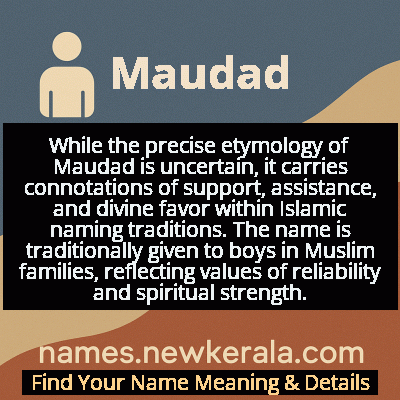Maudad Name Meaning & Details
Origin, Popularity, Numerology Analysis & Name Meaning of Maudad
Discover the origin, meaning, and cultural significance of the name MAUDAD. Delve into its historical roots and explore the lasting impact it has had on communities and traditions.
Name
Maudad
Gender
Male
Origin
Muslim
Lucky Number
8
Meaning of the Name - Maudad
While the precise etymology of Maudad is uncertain, it carries connotations of support, assistance, and divine favor within Islamic naming traditions. The name is traditionally given to boys in Muslim families, reflecting values of reliability and spiritual strength.
Maudad - Complete Numerology Analysis
Your Numerology Number
Based on Pythagorean Numerology System
Ruling Planet
Saturn
Positive Nature
Ambitious, efficient, realistic, and authoritative.
Negative Traits
Materialistic, stressed, confrontational, and can be overly ambitious.
Lucky Colours
Dark blue, black.
Lucky Days
Saturday.
Lucky Stones
Blue sapphire, amethyst.
Harmony Numbers
2, 4, 6.
Best Suited Professions
Business leaders, managers, financial services, law enforcement.
What People Like About You
Leadership, determination, organizational skills.
Famous People Named Maudad
Maudad Chishti
Sufi Saint
Key figure in the Chishti order of Sufism, known for spreading Islamic spirituality in South Asia
Maudad al-Harawi
Islamic Scholar
Renowned Persian jurist and theologian who authored several influential works on Islamic law
Maudad Khan
Military Commander
Mughal general who served under Emperor Akbar and played significant roles in various military campaigns
Maudad Ahmed
Contemporary Scholar
Modern Islamic thinker known for his work on contemporary Muslim intellectual traditions
Name Variations & International Equivalents
Click on blue names to explore their detailed meanings. Gray names with will be available soon.
Cultural & Historical Significance
The name's usage reflects the Islamic practice of choosing names with positive meanings and spiritual connotations. Throughout history, individuals named Maudad have often been associated with leadership, scholarship, and religious devotion. The name's persistence across centuries demonstrates its enduring appeal in Muslim societies, particularly in regions influenced by Persian and South Asian Islamic cultures where it maintains its traditional resonance while adapting to contemporary naming practices.
Extended Personality Analysis
Individuals named Maudad are often perceived as possessing strong leadership qualities combined with a supportive nature. They tend to be reliable, steadfast, and demonstrate loyalty in their relationships and commitments. The name carries connotations of strength and dependability, suggesting someone who can be counted on during challenging times and who provides stability to those around them.
Maudad is typically associated with individuals who exhibit wisdom beyond their years, often serving as advisors or mentors within their communities. They tend to approach problems with practical solutions and maintain calm under pressure. The name suggests a person who balances traditional values with progressive thinking, making them effective bridges between different generations or cultural perspectives. Their inherent sense of responsibility often leads them to positions where they can guide and support others.
Modern Usage & Popularity
In contemporary times, Maudad remains a traditional choice within Muslim communities, particularly in South Asia and among diaspora populations. While not among the most popular Islamic names, it maintains steady usage among families seeking names with historical and spiritual significance. The name has seen a slight resurgence in recent years as part of a broader trend toward reviving classical Islamic names that carry deep cultural meaning. Its usage is most common in Pakistan, India, Bangladesh, and among Muslim communities in the Middle East, with occasional appearances in Western countries through immigration.
Symbolic & Spiritual Meanings
Symbolically, Maudad represents the concept of divine support and assistance in Islamic tradition. The name evokes images of strength through faith, suggesting someone who serves as a pillar for their community. It carries metaphorical associations with reliability, protection, and spiritual backing, often interpreted as representing God's support for the faithful. In cultural contexts, the name symbolizes the ideal of being both a strong leader and a compassionate supporter, embodying the balance between authority and service that is valued in Islamic ethical traditions.

